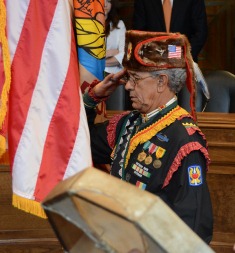Washington D.C. –
U.S. Senator Daniel K. Akaka (D-Hawaii), Chairman of the Senate Committee on Indian Affairs, held an oversight hearing on Programs and Services for Native Veterans, today.

“Due to their political status as Native Americans as well as their status as veterans, Native veterans are eligible for federal programs and services through the Department of Veterans Affairs (VA) and the Indian Health Service (IHS),” said Dr. Yvette Roubideaux, the Director of the Indian Health Service, in testimony submitted to the Committee.
Despite the fact that they are eligible for dual coverage, a lack of information sharing and coordination between the agencies had often resulted in Native veterans wrongly being denied care.
In order to ensure Native veterans receive the care and benefits they earned through their service, the Department of Veterans Affairs established the Office of Tribal Government Relations in January 2011.
“Our office has been charged to develop partnerships with American Indian and Alaska Native Tribal governments to enhance access to services and benefits for Native veterans,” said Stephanie Birdwell, Director of the new Office of Tribal Government Relations. “One of our first orders of business was to work with the IHS to foster an environment that brings together the strengths and expertise of each organization to actively improve the care and services provided by both agencies.”
“[In the past] the VA has been a complex system which is intimidating and frustrating for veterans to navigate,” said Wayne Burke, Tribal Chairman of the Pyramid Lake Paiute Tribe and Marine Corps veteran. “But now the IHS and VA are working in collaboration with Tribal Nations to ensure the government to-government trust obligations are being met.
“We see a future where VA demonstrates its commitment to Native American Veterans by being culturally competent, respecting the unique sovereign status of Tribes, and reaching out to Veterans in their communities,” said Birdwell. “We are committed to building relationships with Tribal leaders built on a culture of trust and respect. We see a bright future, but there is still much to be done.”
“The work you are doing in the communities is incredible, and I encourage you to kulia i ka nu’u, strive for the highest, as you continue to work with our Native veterans,” Chairman Akaka concluded. “Working in the spirit of lokahi, of collaboration and cooperation, will enable your agencies to maximize the reach of the resources available.”
“I am very grateful to Senator Akaka for holding this important hearing and for supporting our Native Veterans,” said D. Noelani Kalipi, Army veteran and President of the TiLeaf Group, a Native Hawaiian advocacy organization. “Senator Akaka has been a champion for improving rural services, for the creation of direct home loan programs and for cemetery grants for Native Veterans. Native American programs in the VA are stronger today because of Senator Akaka.”
END
Contact: Emily Deimel
Contact Phone: 202-224-3667
Contact E-mail: emily_deimel@indian.senate.gov
